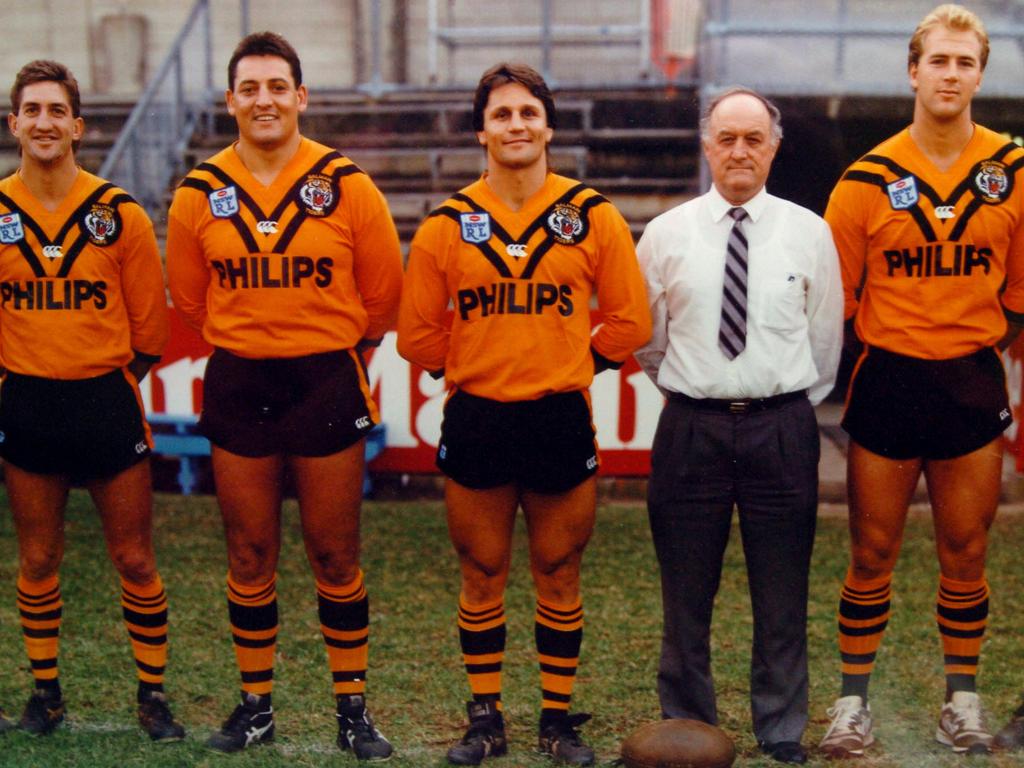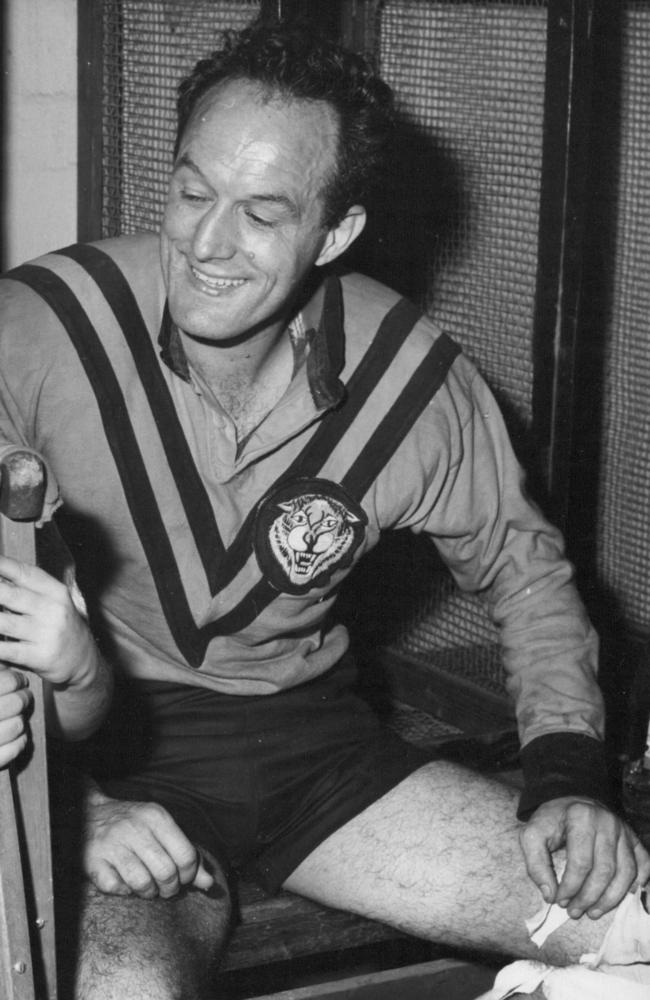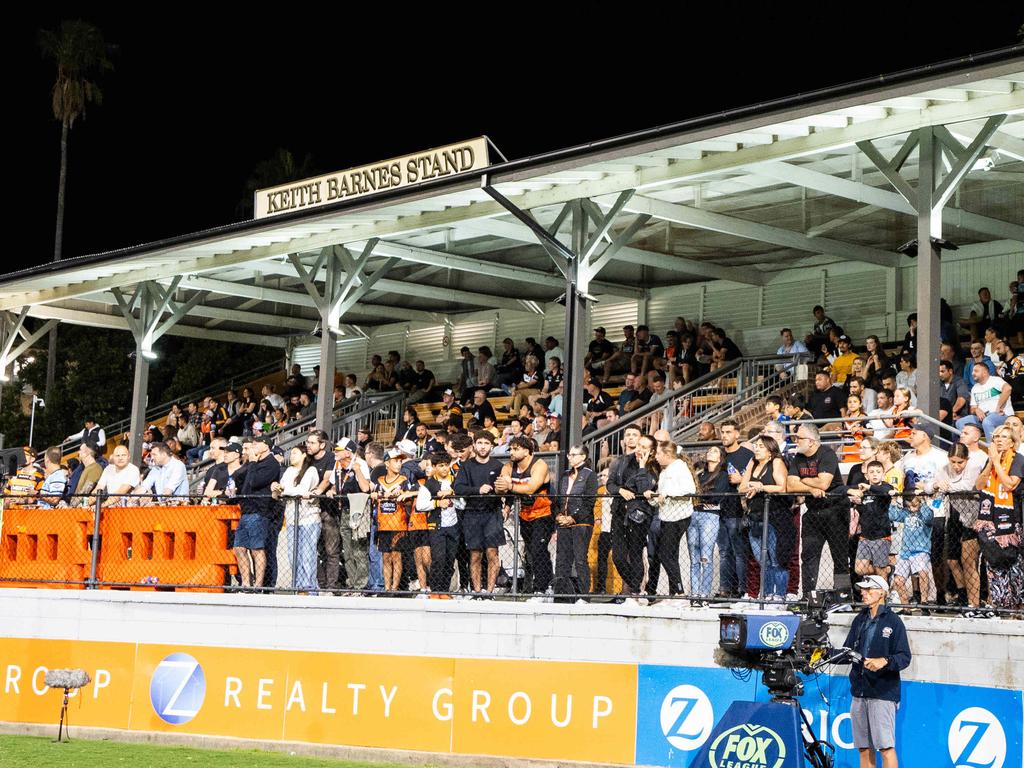Paul Kent’s tribute to Keith Barnes: The story of one of rugby league’s true gentle men
Keith Barnes, the legendary Balmain Tiger who passed away on Monday, owns one of the most heartbreaking statistics in rugby league. But, PAUL KENT writes, it never fazed one of the game’s true gentle men.
NRL
Don't miss out on the headlines from NRL. Followed categories will be added to My News.
Few more gentle men ever played the game, or ruled their postcode as footy administrators, like Keith Barnes.
After a lifetime in the game, his kindness for others kicked back on him only ever once.
Barnes died on Monday, aged 89, and left behind a lifetime of friends.
He somehow was able to keep together a playing squad that had five internationals in the pack — Steve Roach, Benny Elias, Wayne Pearce, Paul Sironen and Bruce McGuire — as well as NSW Blue David Brooks and international Garry Jack at fullback, and they all felt his loss yesterday.
It would not happen in the game today. Nowadays a player will leave a team because he doesn’t like the position he is picked in and yet Barnes had a pack that was as talented and fearsome as any in the game, where he applied a simple philosophy for getting the deals done and keeping them together.
“Everybody gets paid the same,” he told Roach during contract negotiations one day.
“Except for Benny. He gets a little more because he’s better.”
Barnes had a charm, a kindness which became all the more disarming because of his Welsh accent.
When Bob Fulton tried to get Elias to Manly with an offer that would have seen him significantly add to his real estate empire Barnes sat him down for some homespun advice.

“It’s an extra $50,000,” he said, back in a time when that was real money, the top players on not much more than $100,000 in total.
“And by the time you pay tax it’s just an extra $25,000,” he said.
He whittled it down, the cost of moving, the travel, all that, until he had Elias earning about 25 cents more by going to Manly, and so he stayed with the Tigers.
He was Tiger all the way through and he made the players understand what it meant.
He was running Balmain Tigers and Balmain Leagues back in the 1990s on a staff of two.
Just Elias, his marketing manager, and his secretary Pat Crow.
They carry more salaries in the coaches box nowadays.
If he wasn’t the first, then he was beaten in a developed print as the first club boss to bring families into the club, with creches and family barbecues and the like.
Barnes was so effective as an administrator in his later years few remember he was a rare player.
He was the greatest goal kicker in the game at the time, and possibly ever, all things considered, regularly able to send penalty goals through the sticks from his side of halfway.
It was the only advantage the old leather balls, which lacked the consistency of today’s synthetic versions, gave him over today’s kickers.

He captained the Kangaroos 14 times in 17 Tests, ran out for his Tigers 194 times.
He retired in 1968 having never won a premiership, the last two seasons as captain-coach, and the irony of sport bit him when the Tigers went on to take out the premiership the following season.
It was another quirk that came back to haunt him many years later, retiring as Wests Tigers chief executive in 2004, a year before the Tigers won the 2005 premiership.
In and around that, Barnes was a premier fullback in an era which saw the emergence of the fullback as an attacking threat.
His career was sandwiched between two Immortals, Clive Churchill and Graeme Langlands, but he was good enough to play for Australia and make the ARL Hall of Fame in 2007.
As for that kindness, the only time it ever backfired on him was in the early days of the modern charge sheet, when players were first being charged with careless, reckless or intentional actions instead of simply being sent off and forced to front the judiciary on a Monday night.
It took time for many to get their heads around.
Balmain wrecking machine Martin Masella was charged with a careless high tackle and made his way to the hearing that Monday, with Barnes representing him. That’s how it commonly happened back then.

Judiciary chairman Alan Sullivan, now a commissioner, opened the hearing and called on Barnes for his opening statement.
“Marty isn’t a dirty player,” he began.
“Look at the tackle. It certainly wasn’t intentional. It wasn’t reckless. He might have got a little careless but ...”
At that, Sullivan stopped him.
“Mr Barnes,” he said, holding up his hand. “Mr Masella is only charged with a careless tackle. Guilty!”
And he slapped the gavel down.
The hearing didn’t last 40 seconds.
Barnes looked around wondering what had just happened.
It was the only time his agreeable nature let him down, but even still he was always able to later laugh at what happened.
Yesterday Benny Elias called his wife Robyn to pass on his sympathies.
“You’ve got no idea what a wonderful husband he’s been since the moment I met him,” she told him.
Originally published as Paul Kent’s tribute to Keith Barnes: The story of one of rugby league’s true gentle men







